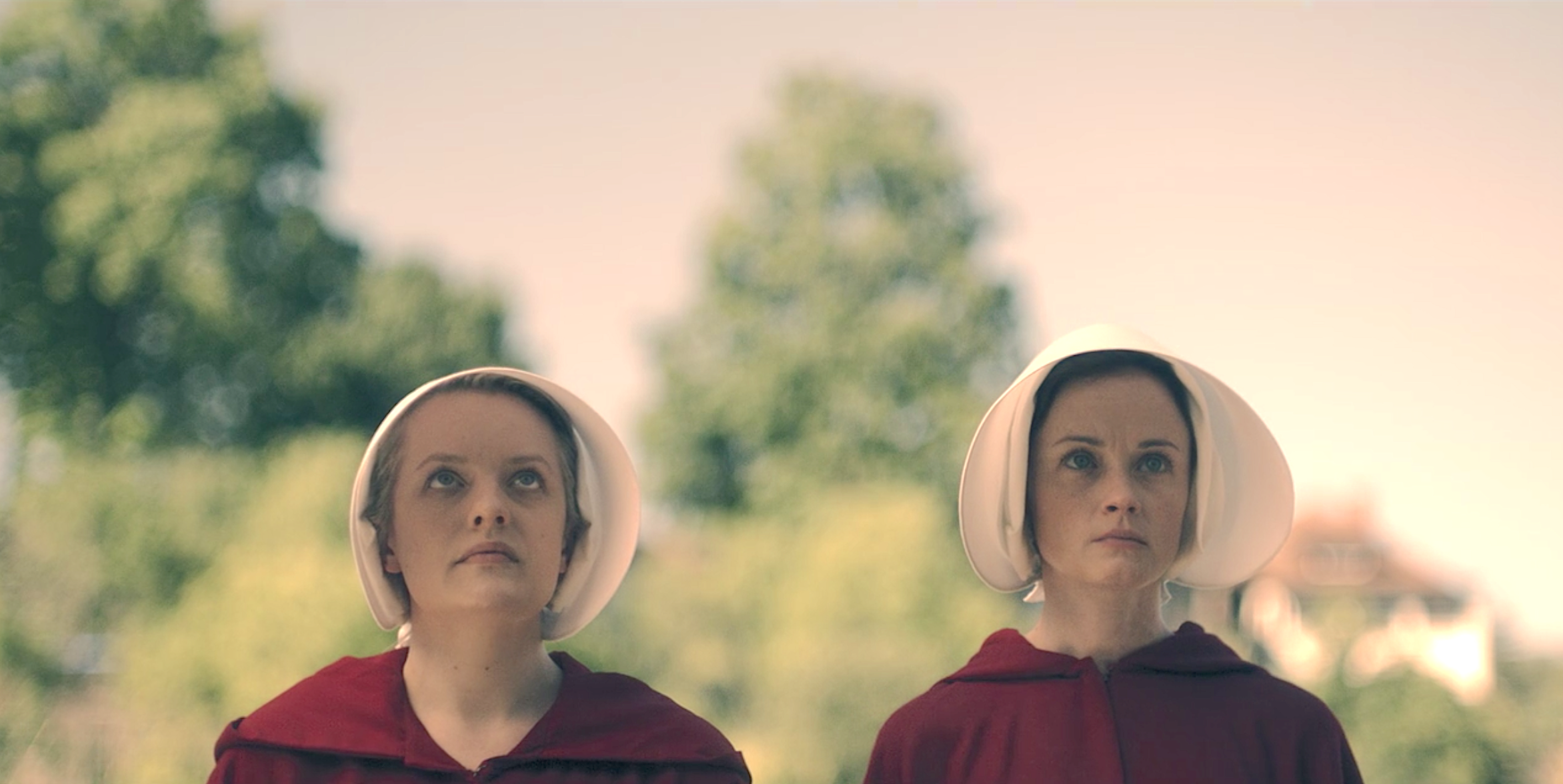Before my wife started watching the new series streaming from Hulu, I warned her: “I can’t imagine how I would feel if a woman”. I had already finished first hour “Offred” from the production based on 1985 tome The Handmaid’s Tale by Margaret Atwood. Three episodes are online now—and their tone and timeliness are visceral and all too familiar, like was the Battlestar Galactica miniseries that followed the 9-11 terrorist attacks by two years. There is something that is too real, too possible—and, unlike the so-called Trump “Resistance”, I don’t refer to the current government in Washington, D.C. No imminent right-wing coup is on the horizon, as so many Liberals want to believe. That’s as fictional as The Handmaid’s Tale.
What’s disturbing is another kind of currency, which is largely lost in the torrent of “it could happen here” commentary: The plight of women portrayed in the series isn’t far removed from what many of them experience elsewhere in 2017. Not in some alternate-reality United States, but across swaths of Africa, Asia, and the Middle East—if not both American continents and Europe. Severity may vary by degrees, but where on this planet isn’t there, at the least, some vestige of the subservient, objectified woman? Liberals, who as a class supposedly champion for the human rights of all people, shouldn’t ignore what is while obsessing about what might be for fear it could happen to them.
Something else: Reactions to the Hulu series is a prime example of confirmation bias at work, in ways most of us would never recognize. In the circles were I read or socialize, there is general aghast about the Republic of Gilead and what Offred and other Handmaids endure there. These folks see what confirms their points of view—their biases about right and wrong, good and evil (which I generally share, BTW). But I tell you this: There are others, whether individuals or groups, who see something else. For them, The Handmaid’s Tale confirms their biases about how the United States should be governed and their role in the nation and its culture. They aspire for something like the Republic of Gilead.
Oh, you disagree? Let’s circle back to human rights in the here and now. Consider the ISIS occupation of Iraqi city Mosul that started nearly three years ago. Residents’ stories about life under the jihadists is disturbingly similar to that portrayed in Hulu’s The Handmaid’s Tale: Establishing a religious police force; enforcing dress and grooming codes; preventing girls from attending school; destroying history (such as historical buildings and artifacts); executing people for seemingly minor offenses; and censoring information—as but some examples. All of these things take place during the first three The Handmaid’s Tale episodes.
Futures Foreshadowed
As a viewer, I see the series so far as the best dramatic storytelling since the Battlestar Galactica miniseries aired on Syfy 14 years ago. Perhaps it’s no coincidence that both are dystopian tales from the speculative fiction genre. Both are contemporary revisions of earlier works—best-selling book for one, and schlocky, one-season scifi series for the other. Each takes an alternate humanity and uses familiar circumstances, motifs, objects, and technologies to pluck our emotions. These are believable storylines—and more so today then when the originals were conceived.
Consider first: Battlestar Galactica, which envisions a race of robots returning to annihilate their creators. On our planet, in the here and now, as artificial intelligence advances, so should serious questions about morals and mores. From autopilots in airplanes and automobiles to the algorithms that open the Internet and proverbial microscopes into our individual lives, robotic intelligence already is reality. A future, like BSG portrays, where humans create mechanical, thinking Cylons closes on us. Science fiction is fact.
The Handmaid’s Tale’s future is horrifically titillating for its sudden believability, which far exceeds excellent storytelling so far as convincingly crafted by director Reed Morano. Much as the original dystopian drama appealed to me, I discounted as hugely unlikely the majority of women becoming infertile. That was 1985. In 2017, when contracted by pregnant woman, the Zika virus typically causes birth defects. Suddenly, from Zika to something else, the idea of a pandemic making women infertile or leading to mass miscarriages isn’t inconceivable. Nor is, in the aftermath, rise of something like the Republic of Gilead that seeks to purge so-called sinful behaviors that brought God’s punishment.
In closing, I highly recommend two articles that enlighten about The Handmaid’s Tale book and author Margaret Atwood. Perspective and context are everything, and both deliver: “Margaret Atwood on What The Handmaid’s Tale Means in the Age of Trump” by the author in the New York Times“; “Margaret Atwood, the Prophet of Dystopia” by Rebecca Reed in the New Yorker.
